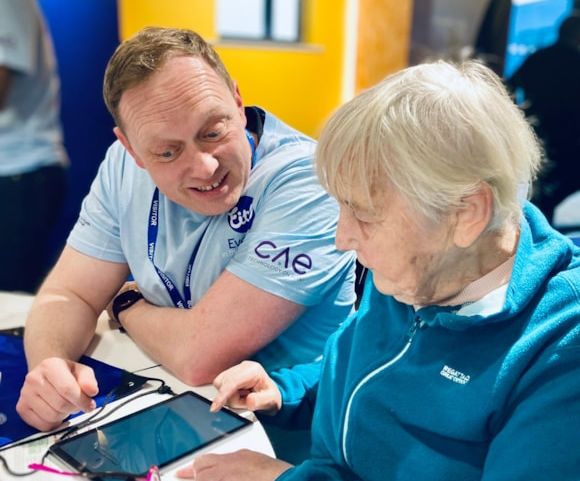A pioneering scheme to get more people in the Liverpool City Region online has hit its target of helping more than 4,500 residents, helping them access jobs, employment, healthcare and other online services.
Launched in August 2023, the Digital Inclusion Initiative (DII), a ground-breaking public-private partnership, has provided a total of 4,700 people with a free Android™ tablet, along with in-person training in digital skills, and six months of free mobile connectivity.
The project has transformed people’s lives, providing the skills, devices and connectivity needed to access jobs and education, use online services and keep in touch with family and friends.
Prior to the programme, 41% of participants had no access to a digital device. Following the sessions, 95% were “very” or “extremely” confident at setting up a device, connecting to the internet, using email and keeping safe online.
The DII has supported over 450 participants on the Government’s Restart scheme, which helps people who are long-term unemployed back into work and is led by G4S Supply Chain Organisations in the Liverpool City Region, many of whom found a job following this programme, showcasing the impact of digital access, skills and connectivity in re-entering the workforce.
And 69% of 300 participants on the Combined Authority’s Households into Work programme, that also helps people back into employment, achieved accredited education, employment or training outcomes.
The Liverpool City Region Combined Authority partnered with Lloyds Banking Group, Vodafone UK and Assurant to bridge the digital divide by driving digital skills, enhancing lives, and stimulating economic growth across the UK.
Roll-out in the Liverpool City Region started with a pilot delivering tablets, connectivity and training to 300 local people who were unemployed or economically inactive.
Since that pilot phase, the initiative has grown dramatically. Assurant, (NYSE:AIZ), a leading global business services company, provided financial backing, local social enterprise; FRC Group provided logistical resources and expertise via its digital inclusion project, ReUse IT; while 105 local partner organisations enabled the accelerated roll-out of the programme across the Liverpool City Region Digital Inclusion Network.
The Lloyds Bank Academy led the digital skills training with sessions to help all participants get set up on their device for the first time. Covering topics from online safety, the online job market and support with downloading useful applications. In addition, the Lloyds Bank Academy provided “Train the Trainer” sessions to upskill 85 staff members from local organisations to deliver the digital skills training themselves. This helped even more people who might be excluded from wider society to get online and ensures there is long lasting digital skills knowledge that remains in the community.
Access to connectivity, including internet data, was provided by Vodafone UK as part of its everyone.connected initiative, with users benefiting from a ‘Mi-Fi’ dongle that provided a free portable hotspot for an entire home with 40 gigabytes (GB) of free monthly data, calls and texts for six months. In total, over 1.1 million GB of data has been donated.
This programme has demonstrated the impact of partnerships working to tackle digital exclusion, supporting the Mayor’s ambition of helping over 10,000 residents with Digital Inclusion Support as part of the Combined Authority’s Corporate Plan.
Steve Rotheram, Mayor of the Liverpool City Region, said:
“Digital inclusion is not just about access to technology – it’s about giving people the tools to transform their lives.
“With more than 4,500 residents now able to access jobs, education, healthcare, and stay connected with their loved ones, this initiative is already making a profound difference in our communities.
“The Liverpool City Region was the first in the country to launch a Digital Inclusion Initiative like this, and it’s a perfect example of what we can achieve when we work together.
“This is just the beginning, and I’m determined that we will continue to bridge the digital divide and build a future where no one is left behind.”
Cllr Liam Robinson, Liverpool City Region Combined Authority Cabinet Member for Innovation, said:
“Technology and connectivity play an increasingly central role in our economy and our lives, which is why we’re committed to making the Liverpool City Region the most digitally connected in the country.
“The increasingly dominant role of connectivity means those who cannot navigate the new digital world risk falling further and further behind, unable to access jobs and services, and even becoming isolated from family and friends.
“That’s why I’m so proud of what we have achieved through this – helping thousands of people get online and building the capacity of community organisations to continue to support more people in the future.”
Jemma Waters, Head of Group Customer Inclusion at Lloyds Banking Group said:
“Supporting people in our communities who aren’t online regularly, or perhaps at all, is important to us. The Lloyds Bank Academy wants everyone to have the opportunity to use the growth in digital technology in a way that works for them. Whether that is for shopping, paying bills, or simply connecting with family and friends. We are proud to have partnered with Liverpool City Region to help thousands of people get online and learn the skills to make the most of safely using the digital world.”
Nicki Lyons, Chief Corporate Affairs & Sustainability Officer, Vodafone UK, said:
“Connectivity has become central to the way we live our lives, from securing jobs to paying bills or keeping in touch with loved ones. But for those who don’t have access to the online world, whether due to a lack of skills or means, these everyday tasks can feel constantly out of reach.
“At Vodafone, we believe that everyone should have access to the benefits connectivity brings and that’s why tackling digital exclusion is at the heart of our business.
“Since 2021, we’ve donated connectivity and technology across the nation through our everyone.connected initiative, which aims to help four million people and businesses cross the digital divide by the end of 2025. It’s through partnerships like this, with the Liverpool City Region Combined Authority, that we’re able to make real progress and ensure nobody is left behind.”
Lee Sturgeon, UK Managing Director from Assurant said:
“Assurant is proud to have played a pivotal role in the successful roll out of the digital inclusion scheme and achieving its ambitions. It’s great to see how the tablets and MiFi devices donated by our business have made a real difference to so many Liverpool City Region residents and supporting the removal of digital exclusion.
“As a purpose-driven company, we help our customers and local communities maximise opportunities in a connected world in a way that contributes to a thriving society. We do this by focusing on creating an inclusive society where as many people as possible have opportunities to learn and grow; supporting communities through investing our time, skills, and resources where needed; and creating superior experiences for our customers.
“We’d like to congratulate Lloyds Banking Group, Vodafone and all partners who have collaborated to make this happen.”
Shaun Doran, CEO at FRC Group said:
“FRC Group is proud to support the Liverpool City Region’s Digital Inclusion Initiative. This project has empowered a huge number of residents with the skills and tools needed to access essential online services that are vital for education, employment, and staying connected. It’s a testament to the power of partnership between public, private, and third sectors, and we’re committed to continuing our work to advance digital inclusion across the region.”
Digital inclusion means all individuals and communities have access to, and can effectively use, digital technologies. It also bridges the digital divide, which is the gap between those who have access to and know how to use digital technologies, and those who don’t.
The Liverpool City Region Digital Inclusion Network, led by the Combined Authority, is committed to providing equal opportunities and resources for individuals to access and engage in modern digital life. Working across 180 organisations, the network brings together providers supporting residents online and tackling the digital divide.
Those experiencing ‘digital exclusion’ are often closely aligned to factors such as deprivation, labour market status or protected characteristics. These are further compounded by issues such as increases to cost-of-living and wider economic contraction.
The levels of multiple deprivation in the City Region play a part in higher levels of poverty experienced by residents than elsewhere in the UK. More than a third of our neighbourhoods are in the top 10% most deprived nationally[1], significantly higher than all other Combined Authorities. This impacts access to services, education, health, housing and income. With this deprivation, digital deprivation is a common crossover factor.
Digital inclusion is crucial for reducing inequalities, promoting economic growth, and empowering individuals and communities. It enables people to access educational resources, job opportunities, healthcare services, government services, and other benefits that are increasingly available online. Increasing digital inclusion can help create equitable and connected communities.
The University of Liverpool’s Heseltine Institute estimate there are over 325,000 digitally excluded working-age individuals in the city region who are limited or non-users of the internet, with additional research by the Good Things Foundation, University of Liverpool and Loughborough University estimating more than 50% of households with children in LCR do not meet the newly established Minimum Digital Living Standard. [2]
Find out more about digital inclusion in LCR at: www.helpingyouonline.co.uk
Do you have a story for Stand Up For Southport? Please message Andrew Brown via Facebook here or email me at: mediaandrewbrown@gmail.com






